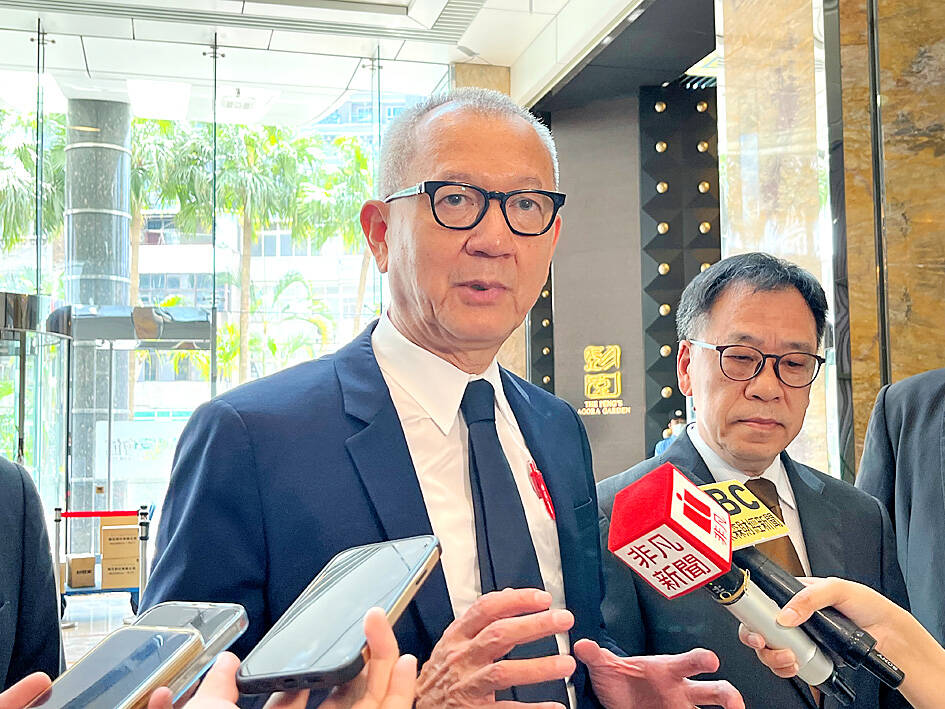Yageo Corp (國巨) yesterday said it plans to acquire a major stake in local power management chip designer uPI Semiconductor Corp (力智電子) for NT$5.31 billion (US$ 164.6 million) at most, the latest in a string of strategic investments in semiconductor firms.
The acquisition would help boost Yageo’s presence in the artificial intelligence (AI) and high-performance computing (HPC) applications market, the company said. It would hold a 20.23 percent stake in uPI after a private placement subscription deal is closed, making Yageo the biggest single stakeholder of the chip designer.
The board of directors agreed to purchase 21 million of uPI shares at a maximum price tentatively set at NT$253 each, Yageo’s filing with the Taiwan Stock Exchange yesterday showed.

Photo: Chang Huei-wen, Taipei Times
Shares of uPI rallied 3.99 percent to close at NT$300 yesterday before the acquisition plan was disclosed.
“We believe uPI’s strong design capabilities across many different important semiconductor products, especially in its multi-phase Vcore [voltage core] controller ICs [integrated circuits] and its highly integrated power stages, will best complement our existing portfolio,” Yageo chairman Pierre Chen (陳泰銘) said yesterday.
“Given the nature of having to work closely with CPU [central processing unit], GPU [graphic processing unit] and memory for Vcore controller ICs and power stages, this strategic investment into uPI will further strengthen our relationships with world-leading IC design companies to be even earlier in the customers’ design cycle,” he said.
uPI specializes in power management ICs and power discrete products such as metal–oxide–semiconductor field-effect transistors (MOSFET). It also develops high-density power management solutions and high-performance power components used in AI-related applications and HPC devices such as servers.
Yageo expects the transaction would create synergies, as its semiconductor subsidiary Advanced Power Electronics Corp (富鼎) is one of the nation’s biggest makers of MOSFET, a device that is widely used for switching and to amplify electronic signals.
“The key rationale behind the private placement is to accelerate and to open up more opportunities through leveraging Yageo’s strengths in its brand and channels in high-end applications like high-performance computing, automotive, industrial and medical, as well as [in] premium markets like North America, Europe, Japan and [South] Korea,” uPI chairman S.Y. Hsu (許先越) said.
uPI reported NT$116 million in net profit for the first quarter, reversing a loss of NT$22 million during the same period last year.
Earnings per share rose from a loss of NT$0.28 in the first quarter last year to NT$1.41 last quarter.
Gross margin rose from 22.7 percent a year earlier to 33.1 percent last quarter.

Nvidia Corp chief executive officer Jensen Huang (黃仁勳) on Monday introduced the company’s latest supercomputer platform, featuring six new chips made by Taiwan Semiconductor Manufacturing Co (TSMC, 台積電), saying that it is now “in full production.” “If Vera Rubin is going to be in time for this year, it must be in production by now, and so, today I can tell you that Vera Rubin is in full production,” Huang said during his keynote speech at CES in Las Vegas. The rollout of six concurrent chips for Vera Rubin — the company’s next-generation artificial intelligence (AI) computing platform — marks a strategic

REVENUE PERFORMANCE: Cloud and network products, and electronic components saw strong increases, while smart consumer electronics and computing products fell Hon Hai Precision Industry Co (鴻海精密) yesterday posted 26.51 percent quarterly growth in revenue for last quarter to NT$2.6 trillion (US$82.44 billion), the strongest on record for the period and above expectations, but the company forecast a slight revenue dip this quarter due to seasonal factors. On an annual basis, revenue last quarter grew 22.07 percent, the company said. Analysts on average estimated about NT$2.4 trillion increase. Hon Hai, which assembles servers for Nvidia Corp and iPhones for Apple Inc, is expanding its capacity in the US, adding artificial intelligence (AI) server production in Wisconsin and Texas, where it operates established campuses. This

Garment maker Makalot Industrial Co (聚陽) yesterday reported lower-than-expected fourth-quarter revenue of NT$7.93 billion (US$251.44 million), down 9.48 percent from NT$8.76 billion a year earlier. On a quarterly basis, revenue fell 10.83 percent from NT$8.89 billion, company data showed. The figure was also lower than market expectations of NT$8.05 billion, according to data compiled by Yuanta Securities Investment and Consulting Co (元大投顧), which had projected NT$8.22 billion. Makalot’s revenue this quarter would likely increase by a mid-teens percentage as the industry is entering its high season, Yuanta said. Overall, Makalot’s revenue last year totaled NT$34.43 billion, down 3.08 percent from its record NT$35.52

PRECEDENTED TIMES: In news that surely does not shock, AI and tech exports drove a banner for exports last year as Taiwan’s economic growth experienced a flood tide Taiwan’s exports delivered a blockbuster finish to last year with last month’s shipments rising at the second-highest pace on record as demand for artificial intelligence (AI) hardware and advanced computing remained strong, the Ministry of Finance said yesterday. Exports surged 43.4 percent from a year earlier to US$62.48 billion last month, extending growth to 26 consecutive months. Imports climbed 14.9 percent to US$43.04 billion, the second-highest monthly level historically, resulting in a trade surplus of US$19.43 billion — more than double that of the year before. Department of Statistics Director-General Beatrice Tsai (蔡美娜) described the performance as “surprisingly outstanding,” forecasting export growth